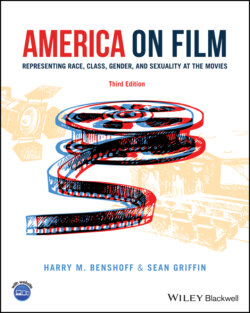Читать книгу America on Film - Sean Griffin - Страница 9
На сайте Литреса книга снята с продажи.
ACKNOWLEDGMENTS
ОглавлениеThe origins of this book can be traced back to a class we both taught at Antelope Valley Community College in Lancaster, California, when we were PhD students at the University of Southern California’s School of Cinema–Television. We “inherited” the class from Jaime Bihlmeyer when he took another position. Jaime had created his own set of readings for the course, because, as we quickly discovered, there were very few published texts available that covered “diversity in American film” with the historical and theoretical consistency that we desired. Thus, our colleagues and students at Antelope Valley College are the first people we wish to thank.
Sean Griffin then taught revised versions of this class at California State University at Long Beach, the University of California at Santa Cruz, and Florida Atlantic University, while Harry Benshoff developed individual courses in African American film and lesbian, gay, and queer media. Our colleagues and students throughout those years contributed to this project in myriad ways, and we especially want to thank Shelley Stamp and Michael Cowan at UCSC.
It was while we were living and working in Santa Cruz that Jayne Fargnoli, our soon‐to‐be editor at Blackwell, asked us what kind of textbooks were needed in film and media studies. We both immediately told her there was a need for a text like America on Film, and a few months later Jayne asked us if we wanted to write the book ourselves. Her support and feedback have been immeasurable, as have those of her assistant, Margot Morse. For the second edition our project manager and copy‐editor, Fiona Sewell, was also extremely helpful in the final stages of the project, as was the book’s production manager, Lisa Eaton.
We would like to thank our current colleagues, students, and support staff at the University of North Texas and at Southern Methodist University. Harry Benshoff’s research and teaching assistants at UNT have contributed to the project in different ways. We’d also like to thank our anonymous readers and especially Alexander Doty, Peter Lehman, David Lugowski, Jacqueline Foertsch, and Travis Sutton, all of whom read various chapters and offered constructive feedback. We also wish to thank those readers who wrote or spoke to us after the first and second editions were published. Their feedback (and occasional corrections!) continues to matter to us. Much of the new material in this third edition came directly from their suggestions on how to make the book even better.
For various reasons, this third edition took a little more time to produce, but we hope we have updated its materials in a useful manner. We’d like to thank Lee Stone for her help with the research, and our editors and support staff at Wiley, especially Catriona King and Liz Wingett, and Mary Malin.
This book is dedicated to our families and friends, the people who have taught us and instilled in us the values of diversity, understanding, education, and love – in both our professional and personal lives. Such acts of sharing can lead to greater understanding and compassion across families, across communities, and across the world. We hope this book encourages people to examine and understand the biases and shaping discourses of contemporary American culture, so that the future may not just promise but also deliver the goal of equality for all Americans, regardless of race, class, gender, sexuality, or ability.
